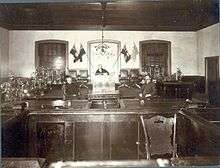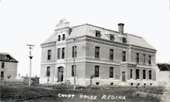Court of Queen's Bench for Saskatchewan
| Court of Queen's Bench for Saskatchewan | |
|---|---|
| Country |
Saskatchewan, Canada |
| Location | Battleford; Estevan; Melfort; Moose Jaw; Prince Albert; Regina; Saskatoon; Swift Current; Weyburn; and Yorkton |
| Authorized by | The Queen's Bench Act, 1998 |
| Number of positions | 33 |
| Website | Court of Queen's Bench |
| Chief Justice | |
| Currently | Martel D. Popescul |
| Since | January 1, 2012 |
The Court of Queen's Bench for Saskatchewan is the superior trial court for the Canadian province of Saskatchewan.
Structure and organization

The Court consists of 32 full-time judges and a number of supernumerary judges, all appointed and paid by the federal government.[1][2] The court's Chief Justice, currently the Honourable Martel D. Popescul, is styled the Chief Justice of the Queen's Bench. Both the Chief Justice and puisne justices are addressed as "My Lord" or "My Lady" and referred to as "His Lordship" or "Her Ladyship". This differs from the terminology used in the Provincial Court of Saskatchewan, whose judges are "Your Honour", "His Honour" or "Her Honour."
The Court sits in 10 judicial centres[3][4][5] and actions are generally brought in the judicial centre closest to where the action arose, or the residence or place of business of the defendant.[6]
Jurisdiction
The Court hears civil and criminal law cases. It is a court of inherent jurisdiction and there is no monetary limit on the claims which it may hear. It also has original jurisdiction over matters assigned to it by statute, such as adjudicating human rights complaints.
The court has a Family Law Division, which has exclusive jurisdiction over family law matters in the judicial centres of Saskatoon, Regina, and Prince Albert, and concurrent jurisdiction (with the Provincial Court) over family law matters in all other areas of the province.[7][8]
As a superior court of original jurisdiction, it has supervisory jurisdiction over administrative tribunals, exercised by the prerogative writs. It also has some appellate jurisdiction, hearing appeals from the Provincial Court of Saskatchewan and some administrative bodies. Appeals may be taken from the Queen's Bench to the Court of Appeal for Saskatchewan. A further appeal lies to the Supreme Court of Canada.
History

Until it became a province in 1905, Saskatchewan was part of the North-West Territories as it existed at that time and its judicial system was that of the territory. In fact, it was not until 1907 - two years after Saskatchewan became a province - that the new province’s judicial system was established.[9] The initial court structure of 1907 consisted of three courts: the Supreme Court of Saskatchewan, the District Court (similar to the County Courts of other provinces) and the Surrogate Court. There was no appeal court; rather, appeals were conducted by the Full Court of the Supreme Court of Saskatchewan, consisting of all the judges of the Supreme Court, other than the judge who made the decision under appeal.

During the First World War, the province reorganized its courts. In 1915, the province passed legislation, The King’s Bench Act [10] and The Court of Appeal Act,[11] for the purpose of creating a new court structure. Those acts came into effect on March 1, 1918, resulting in the abolition of the Supreme Court of Saskatchewan and the creation of the trial-level Court of King’s Bench and the Court of Appeal.[12][13]
In 1981, Saskatchewan merged its District Court into the Court of Queen's Bench.[14] As part of that process, the judicial centres of the District Court became the judicial centres of the Court of Queen's Bench.
Styling
The Court of King's Bench Act foresaw the need to rename the Court in the event of a female monarch. The Act provides that, during the reign of a Queen, the Court is known as the Court of Queen's Bench for Saskatchewan. Should the monarchy be vested in a King, it will be known as the Court of King's Bench for Saskatchewan.[15]
Courts of Saskatchewan
There are three main courts in Saskatchewan:
- Court of Appeal for Saskatchewan – appellate court; highest court of Saskatchewan.
- Court of Queen's Bench for Saskatchewan – superior trial court of Saskatchewan with inherent and unlimited jurisdiction
- Provincial Court of Saskatchewan – court of first instance; trial court with jurisdiction defined by statute
Notes
- ↑ Courts of Saskatchewan website: Court of Queen's Bench Judges.
- ↑ Peter Hogg, Constitutional Law of Canada, 2nd ed. (Toronto: Carswell, 1985), pp.136-37.
- ↑ Courts of Saskatchewan website: Court of Queen's Bench Locations.
- ↑ The Queen's Bench Act, 1998, S.S. 1998, c. Q-1.01, s. 21.
- ↑ The Queen's Bench Regulations, R.R.S. c. Q-1.01 Reg 1, s. 3.
- ↑ The Queen's Bench Act, 1998, S.S. 1998, c. Q-1.01, s. 22(1).
- ↑ Courts of Saskatchewan website: Court of Queen's Bench Family Law.
- ↑ The Queen's Bench Regulations, R.R.S. c. Q-1.01 Reg. 1, s. 8.
- ↑ Saskatchewan Act, S.C. 1905, c. 42, s. 16.
- ↑ The King's Bench Act, S.S. 1915, c. 10.
- ↑ The Court of Appeal Act, S.S. 1915, c. 9.
- ↑ Courts of Saskatchewan website Queen's Bench History. Retrieved 12 March 2012.
- ↑ Courts of Saskatchewan website Court of Appeal History. Retrieved 12 March 2012.
- ↑ Saskatchewan Archives Board, Court Records
- ↑ Courts of Saskatchewan website Queen's Bench History. Retrieved 12 March 2012.